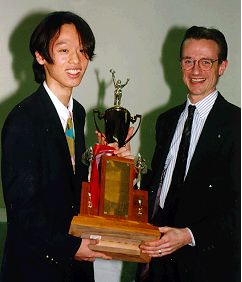TWO NAMES, NO PASSPORT
by Mr. Masataka Hiranuma
When you look at me, who do think I am? If you passed me on the street, would you think I was a foreigner? If you heard me speak Japanese, you probably wouldn't imagine I was a foreigner. However, I am a foreigner in Japan. My original country is Korea. My official name is Yun Jongi. Consequently, until recently, I didn't have a passport.
 My older sister, younger brother, and I were all born in Japan. Our parents were also born in Japan. Their parents came here from Korea after World War II. We three children were raised just the same as ordinary Japanese. However--and you may find this hard to believe--until I was in elementary school, I didn't even know that we were third generation Koreans.
My older sister, younger brother, and I were all born in Japan. Our parents were also born in Japan. Their parents came here from Korea after World War II. We three children were raised just the same as ordinary Japanese. However--and you may find this hard to believe--until I was in elementary school, I didn't even know that we were third generation Koreans.
When my father told us about our true nationality, I was too young to understand the implications it would have for my future. I didn't try to hide my nationality from my classmates at all. On the contrary, I told them in all innocence. One by one, my classmates began to ignore me. I had to accept the harsh reality that I was an "alien."
Throughout junior and senior high school, I never told my classmates about my nationality. I hated it. I hated myself because I felt inferior to them. During junior high school, I started practicing karate to encourage myself both mentally and physically. It was the only way for me to feel some self-esteem. Through practicing karate,
my inferiority changed into indifference. When my classmates asked me about my nationality, I said, "Who cares?" . That was the only way I could respond. Whatever people said to me, whatever people did to me, I didn't care. I kept thinking of the Japanese proverb, "Those who leave me are not missed."
When I successfully completed senior high school, I made up my mind to go to the U.S. to study. It seemed to me that leaving Japan would give me a chance to look back at myself and ask, "Who am I?" Now I am going to try to find the answer. That question bothers not only me, but also every Korean living in Japan.
According to the annual report (of statistics) on legal immigrants, about 3,930,000 foreigners are living in Japan. In Hokkaido, there are 11,822. Of that number, 6,344, or about half, are Koreans, including my family. Most of us are permanent residents, but we are not the same as Japanese. For instance, look at voting rights. Now I am 21 years old. Japanese who are over 20 have the right to vote, but we don't. Also, even if some Korean residents wanted to become government officials, they couldn't.
This is no longer a time of isolation. The Japanese government has declared that this is a time of internationalization, which is vital in preparing for looking ahead to the 21st century. Japanese can travel anywhere, anytime they want. Foreigners can come to Japan and work legally. Is that the real goal of internationalization? I don't think so. What does internationalization mean? In my way of thinking, it means accepting different values, customs, cultures, and ways of thinking. It means living in harmony with all foreigners in Japan. It means learning about each other.
I'm studying English now. When I study English, I feel like I don't belong to either Japan or Korea. So, in the near future, I can choose which country I should belong to. I hope that I can advise the next generation of Koreans how to think. All I want in the future is to be able to help the next generation of either Koreans or Japanese.
It takes a long time to change the way people think. It takes a long time to make a better society for either foreigners or Japanese. However, here's what you can do as a first step. I have two names but don't have a passport, because of my nationality. Even if I won this contest, I wouldn't be able to go to Portland. Won't you help me in getting a passport so I can fulfill my dream?
Program |
ESL Courses |
Content-Based Courses |
Courses for Credit
Students |
Alumni |
Faculty |
Student Advising |
Events |
Latest News |
HCJ Home
 My older sister, younger brother, and I were all born in Japan. Our parents were also born in Japan. Their parents came here from Korea after World War II. We three children were raised just the same as ordinary Japanese. However--and you may find this hard to believe--until I was in elementary school, I didn't even know that we were third generation Koreans.
My older sister, younger brother, and I were all born in Japan. Our parents were also born in Japan. Their parents came here from Korea after World War II. We three children were raised just the same as ordinary Japanese. However--and you may find this hard to believe--until I was in elementary school, I didn't even know that we were third generation Koreans.